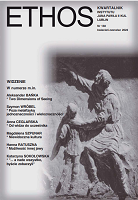POZA METAFIZYKĄ JEDNOZNACZNOŚCI I WIELOZNACZNOŚCI WOKÓŁ ONTOLOGII GILLES’A DELEUZE’A
BEYOND THE METAPHYSICS OF UNIVOCITY AND AMBIGUITY: ON GILLES DELEUZE’S ONTOLOGY
Author(s): Szymon WróbelSubject(s): Metaphysics, Contemporary Philosophy, Ontology
Published by: Katolicki Uniwersytet Lubelski Jana Pawła II - Instytut Jana Pawła II, Wydział Filozofii
Keywords: metaphysical expression; ontology of univocity; truth of relations; rhythm of being; multiplicity;
Summary/Abstract: he main question posed by the author of the article concerns not so much the possibility of metaphysics in the 21st century but how such a metaphysics could be construed: What metaphysics is possible in a postmetaphysical and postfundamental culture? The author answers the question by comparing Martin Heidegger’s ontology of ambiguity and Gilles Deleuze’s ontology of univocity. The paradigm formulated by Deleuze appears to be the polar opposite to the Heideggerian paradigm. Recognizing the philosophical importance of Heidegger’s thought, Deleuze sees his own work as a refutation of the ontology of ambiguity. In Heidegger’s ontology, being precedes difference, while in Deleuze’s ontology, difference precedes being. Sharing numerous themes, Heidegger and Deleuze differ in their programs of radical philosophy of immanence. According to Heidegger, being is ambiguous in the sense that it is expressed in as many ways as there are entities; Deleuze, however, believes that being is unequivocal, united in the production of differences. In consequence, Deleuze’s hyperpolitical ontology opposes Heidegger’s depoliticized ontology. The author attempts to examine the possibilities of going beyond these two propositions by testing, inter alia, the philosophies of Giorgio Agamben, Alain Badiou, and Claude Lefort. All the three theories are considered as reactionary to the paradigm of the ontology of univocity and ontologically limited. As a result, the article defends, despite formulating many critical arguments, the ontology of univocity as the most promising ontological program.
Journal: Ethos. Kwartalnik Instytutu Jana Pawła II KUL
- Issue Year: 35/2022
- Issue No: 2
- Page Range: 105-137
- Page Count: 33
- Language: Polish
- Content File-PDF

